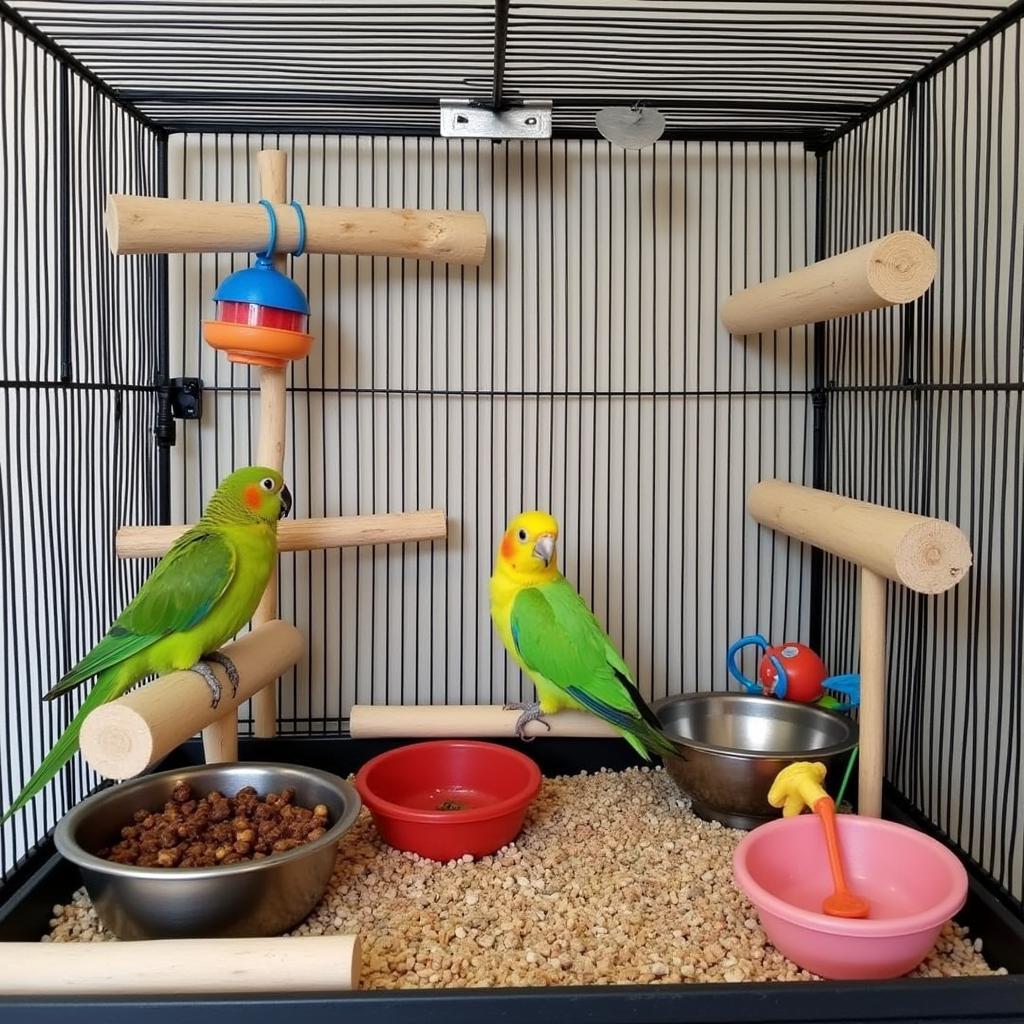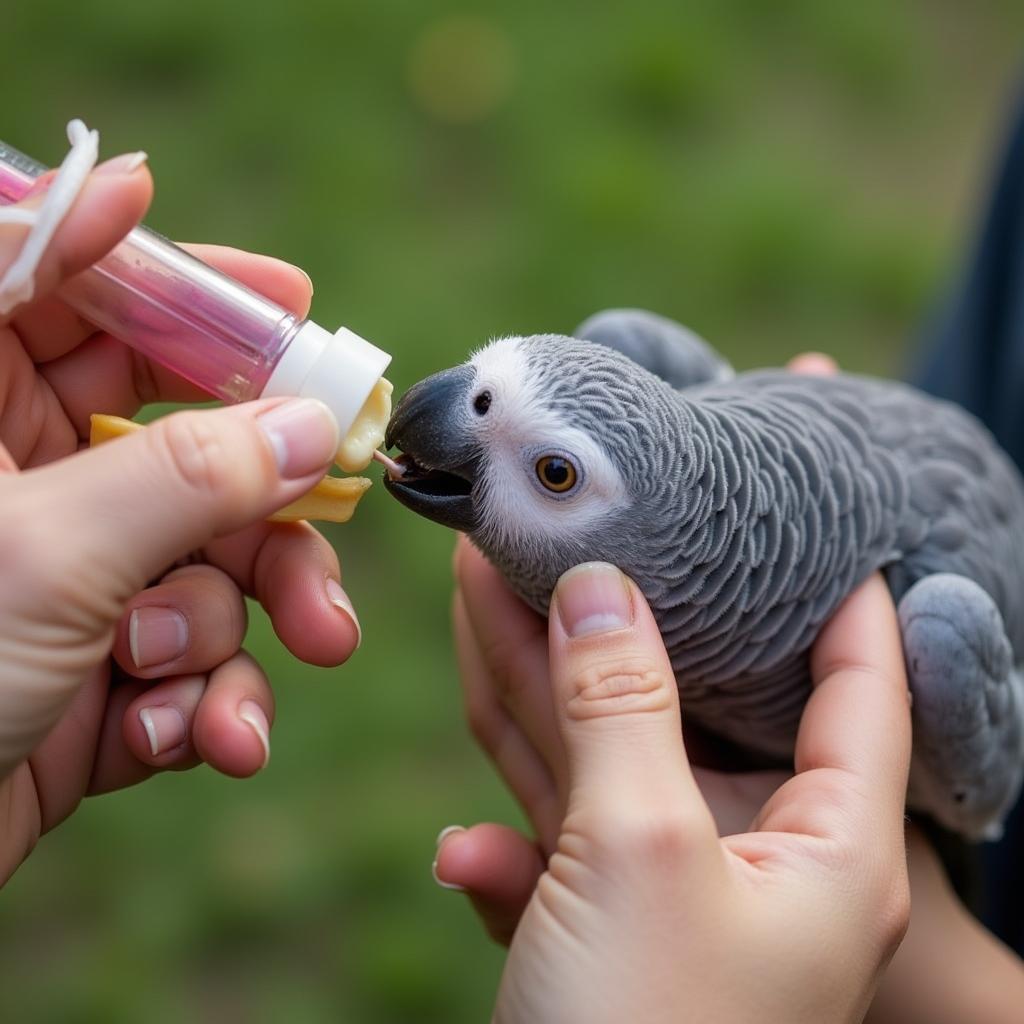African Grey Parrot Baby Care: A Comprehensive Guide
Caring for an African grey parrot baby is a rewarding but demanding experience. It requires patience, dedication, and a deep understanding of their unique needs. This guide provides comprehensive information on all aspects of African Grey Parrot Baby Care, from feeding and housing to socialization and training.
If you’re considering adding a feathered friend to your family, understanding the basics of African grey parrot baby care is crucial. This journey begins with ensuring your baby parrot has the proper diet, a safe and stimulating environment, and plenty of love and attention. Learn more about specific traits of these incredible birds at african grey parrot traits.
Setting Up the Nursery: Housing and Environment
Creating a safe and comfortable environment is paramount for your African grey parrot baby’s well-being. A spacious cage is essential, allowing ample room for movement and play. Perches of varying sizes and textures should be provided to exercise their feet and prevent boredom. Toys are not just for entertainment; they provide crucial mental stimulation and help prevent behavioral issues. Ensure the cage is placed in a quiet, draft-free area of your home, away from direct sunlight and extreme temperatures.
 African Grey Parrot Baby Cage Setup
African Grey Parrot Baby Cage Setup
Feeding Your African Grey Parrot Baby: A Nutritional Roadmap
Proper nutrition is vital for a healthy and thriving African grey parrot baby. Hand-feeding formula specifically designed for parrots is the primary food source for young chicks. As they grow, you can gradually introduce a variety of fresh fruits, vegetables, and high-quality parrot pellets. Learn more about feeding your baby parrot at african grey parrot baby feeding. Avoid avocado, chocolate, and caffeine, as these are toxic to parrots.
What should I feed my baby African grey? Hand-feeding formula is the primary food source.
 African Grey Parrot Baby Feeding Guide
African Grey Parrot Baby Feeding Guide
Socialization and Training: Building a Strong Bond
African grey parrots are highly intelligent and social creatures. Early socialization is crucial for their development and prevents them from becoming fearful or aggressive. Regular interaction with family members and exposure to different sights, sounds, and experiences will help them become well-adjusted companions. Training should begin early, using positive reinforcement techniques such as praise and rewards.
How can I socialize my baby African grey? Regular interaction and exposure to different environments are key.
Health Care and Common Concerns
Like any living creature, African grey parrots are susceptible to certain health issues. Regular check-ups with an avian veterinarian are essential to ensure their well-being. Be vigilant for signs of illness such as changes in appetite, feather plucking, or lethargy. Understanding potential health problems and seeking prompt veterinary care are crucial aspects of responsible African grey parrot baby care. You might be interested in checking out the price range for these adorable companions at african grey parrot baby price.
What are common health concerns for African grey parrots? Feather plucking, respiratory infections, and beak and feather disease are some common concerns.
“Early socialization is key to a well-adjusted African grey,” says Dr. Anya Sharma, a renowned avian veterinarian based in Nairobi. “Expose them to various stimuli early on to help them thrive.”
Weaning your African Grey Parrot Baby: The Transition to Solid Food
Weaning is a critical stage in your African grey parrot baby’s development. It’s the gradual process of transitioning from hand-feeding formula to solid food. This should be done slowly and patiently, offering small amounts of soft foods like mashed fruits and vegetables alongside the formula. As they become more comfortable with solid food, you can gradually decrease the amount of formula. “Patience is crucial during the weaning process,” advises Dr. David Mwangi, an experienced parrot breeder in Tanzania. “Every parrot develops at its own pace, so avoid rushing the transition.”
In conclusion, African grey parrot baby care requires commitment and dedication. By providing proper nutrition, a stimulating environment, and consistent socialization, you can ensure your feathered friend grows into a healthy, happy, and well-adjusted companion. If you’re looking for African grey parrot babies for sale, you might find some resources in Lahore at african grey parrot babies for sale in lahore. For information on a different African animal, check out this article on african crested porcupine care.
FAQ
- What is the ideal temperature for a baby African grey parrot’s environment?
- How often should I clean my baby African grey’s cage?
- What are the signs of a healthy baby African grey parrot?
- How can I prevent feather plucking in my baby African grey?
- When should I take my baby African grey parrot to the veterinarian?
- How do I teach my baby African grey to talk?
- What are the best toys for a baby African grey parrot?
Need more information on parrot care? Check out our articles on parrot diets and training.
Contact us for support: Phone: +255768904061, Email: kaka.mag@gmail.com, or visit us at Mbarali DC Mawindi, Kangaga, Tanzania. We offer 24/7 customer service.

